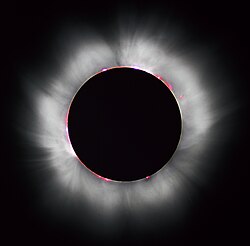**Eclipse**
Tracing back to its etymological roots, “Eclipse” originates from the Greek #1excludeGlossary which translates to “a leaving out” or “abandonment.” Historically, it described the astronomical event where one celestial body obscures another, such as during a solar or lunar eclipse. However, in the context of cannabis, “Eclipse” has taken on a metaphorical meaning, often used to describe a strain or product that surpasses others in quality or effect. This shift in meaning underscores the adaptability of language and the innovative nature of the cannabis industry. As cannabis culture evolves, “Eclipse” has become a term that signifies excellence and innovation, often used to describe products that redefine industry standards. This modern usage reflects the competitive and #6excludeGlossary nature of the cannabis market, where new products and strains continually strive to eclipse their predecessors. [Source: Britannica, Etymonline]
An eclipse is an astronomical event which occurs when an astronomical object or spacecraft is temporarily obscured, by passing into the shadow of another body or by having another body pass between it and the viewer. This alignment of three celestial objects is known as a syzygy. An eclipse is the result of either an occultation (completely hidden) or a transit (partially hidden). A "deep eclipse" (or "deep occultation") is when a small astronomical object is behind a bigger one.


The term eclipse is most often used to describe either a solar eclipse, when the Moon's shadow crosses the Earth's surface, or a lunar eclipse, when the Moon moves into the Earth's shadow. However, it can also refer to such events beyond the Earth–Moon system: for example, a planet moving into the shadow cast by one of its moons, a moon passing into the shadow cast by its host planet, or a moon passing into the shadow of another moon. A binary star system can also produce eclipses if the plane of the orbit of its constituent stars intersects the observer's position.
For the special cases of solar and lunar eclipses, these only happen during an "eclipse season", the two times of each year when the plane of the Earth's orbit around the Sun crosses with the plane of the Moon's orbit around the Earth and the line defined by the intersecting planes points near the Sun. The type of solar eclipse that happens during each season (whether total, annular, hybrid, or partial) depends on apparent sizes of the Sun and Moon. If the orbit of the Earth around the Sun and the Moon's orbit around the Earth were both in the same plane with each other, then eclipses would happen every month. There would be a lunar eclipse at every full moon, and a solar eclipse at every new moon. It is because of the non-planar differences that eclipses are not a common event. If both orbits were perfectly circular, then each eclipse would be the same type every month.
Lunar eclipses can be viewed from the entire nightside half of the Earth. But solar eclipses, particularly total eclipses occurring at any one particular point on the Earth's surface, are very rare events that can be many decades apart.
English
Etymology
From Old French eclipse, from Latin eclīpsis, from Ancient Greek ἔκλειψις (ékleipsis, “eclipse”), from ἐκλείπω (ekleípō, “I abandon, go missing, vanish”), from ἐκ (ek, “out”) and λείπω (leípō, “I leave behind”). Doublet of eclipsis.
Pronunciation
- IPA(key): /ɪˈklɪps/, /iˈklɪps/
- Rhymes: -ɪps





